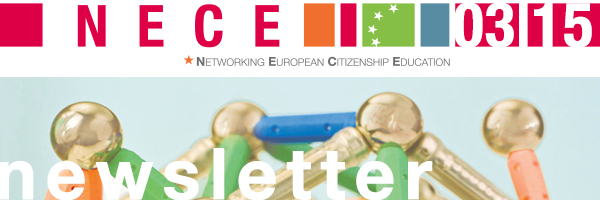 |
|||||||||||||||||||||||||||||||||||||||||||||||||||||||||||||||||||||||||||||||||||||||||||||||||||||||||||||||||||||||||||||||||||||||||||||||||||||||||||||||||||||||||||||||||||||||||||||||||||||||||||||||||||||||||||||||||||||||||||||||||||||||
 |
Follow NECE on twitter and linkedIn. The NECE Conference hashtag is #NECE2015. |
|||||
| NECE NEWS | ||||||
 |
NECE Conference 2015: ‘Us’ and ‘Them’: Citizenship Education in an Interdependent World
22-24 October 2015, Thessaloniki, Greece |
|||||
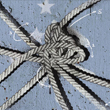 |
Relaunch of the NECE Blog
We are happy to announce that our conference blog will soon be available. Come and join us at http://blog.nece.eu . |
|||||
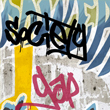 |
“Beyond Them and Us: Hard-to-reach Learners and their Role in Citizenship Education”: Pre-conference Forum held by the NECE Focus Group “Hard-to-reach learners and youth”, 20-21 October 2015
This public forum is being organised by the Focus Group prior to and in close connection with the NECE Conference in Thessaloniki. Under the working title “Beyond Them and Us: Hard-to-reach Learners and their Role in Citizenship Education”, the forum will offer both issue-driven workshops and space for networking and cooperation. Its aim is to build on results from meetings that took place in Berlin, Leicester and Vienna in 2013-2014.
|
|||||
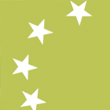 |
Pre-conference meeting of the NECE Focus Group “Exchange between Europe and North Africa”, 19-21 October 2015
The next meeting of the Focus Group “Exchange between Europe and North Africa” will take place in Thessaloniki from 20-21 October 2015 in the final run-up to the NECE conference. The meeting just before the NECE conference offers a great opportunity for experts and practitioners from North African and European countries to get together in order to exchange thoughts and ideas on civic education, draw inspiration for future cooperation projects, discuss recent developments and make new plans.
|
|||||
| EURO-MED COOPERATIONS | ||||||
 |
Africa-Europe Youth Cooperation Online Resource Centre (AEYCO)
The Africa-Europe Youth Cooperation Online Resource Centre (AEYCO) was developed under the Joint Management Agreement secured between the European Commission (EuropeAid Cooperation Office) and the North-South Centre of the Council of Europe. Its aim is to promote continuous updating and monitoring, transparency, knowledge sharing, capacity building and a community of practices to support cooperation processes between young people in Europe and Africa. The centre’s general goal is to map the relevant participants (institutional stakeholders, youth organisations, networks) in AEYCO and foster capacity building and cooperation between the African and European organisations that are working towards Africa-EU strategy goals.
|
|||||
 |
The Speakol Platform
Originally launched in the midst of the Egyptian Revolution as ‘Naqeshny’ (Arabic for “discuss with me”), what’s now called Speakol (Speak Out Loud) has been designed as a free, democratic and open platform for facilitating healthy, critical, political debate and exchange on socio-political conditions in the country. Backed up by a strong user base, the name-change and relaunch are contributing to Speakol’s vision of going global. In the near future, the platform’s priorities will be to provide a unique service to media content publishers and brands in the form of three plug-ins – debates, argument boxes and comparisons – where users can debate two presented sides to a story. Subsequently they are given the chance to vote up or down on an issue, or choose between up to four given options on any topic.
|
|||||
| GOOD PRACTICE: IDEAS & EXAMPLES | ||||||
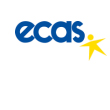 |
European Citizen Action Service
The European Citizen Action Service (ECAS) is an international non-profit organisation based in Brussels with a pan-European membership and 22 years of experience. It provides services to a network of about 150 civil society organizations and citizens on EU citizen rights enforcement and civic participation in the EU decision-making process. The ECAS strategic plan for the period 2014-2017 is organised along three thematic pillars: (1) “EU Resource Centre Services” aimed at strengthening European citizenship, free movement of rights enforcement and enhancing civic participation in the EU decision-making process by providing quality services to both CSOs and citizens throughout Europe; (2) “Open EU Decision-Making”, with
objectives that include contributing to the development of an “engaged EU citizenship” by ensuring improved transparency in EU decision-making and more active citizen participation and collaboration in EU policy formulation, and (3) “Engaging the Unengaged”, which seeks to diversify approaches to outreach and engage Central and Eastern European Member States, citizens and youth.
|
|||||
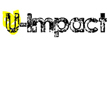 |
National Network for Civil Society (Bundesnetzwerk Bürgerschaftliches Engagement)
The BBE is a Germany-wide network that links organizations and associations from the third sector (non-profit organizations) and civil society with institutions in business and working life at both federal and community levels. |
|||||
| POLITICS & POLICIES & CITIZENSHIP EDUCATION | ||||||
|
A five-point plan for dealing with the refugee crisis: there are no small solutions to big problems
The German Development Institute has developed a five-point plan for the refugee crisis in order to slow down escalation and save lives. The plan emphasizes the necessity for complex initiatives, a significant application of resources and bold political reforms. |
||||||
|
The turmoil of today’s world: leading writers respond to the refugee crisis
Although it’s been an ongoing topic in the news for years, the refugee crisis in Europe has suddenly captured the world’s attention. But what are the underlying causes, and what should individuals and governments do to help? Writers Ali Smith, Mary Beard, Orhan Pamuk and Pankaj Mishra and others share their views. |
||||||
|
Volunteering Matters – a project on citizenship education for young people
Tapping into the skills and potential of young people is key to building stronger, more inclusive communities. With that in mind, Volunteering Matters has joined forces with partners across Europe to develop citizenship education material for children between 8 and 12 years of age. |
||||||
|
DARE Forum – From Development Education to Glocalised Citizenship Education?
The European DARE Forum met on 7 May 2015 in Riga to discuss the future of the Development Education & Awareness Raising (DEAR) sector. Because ‘development’ and ‘development education’ are increasingly viewed as outdated terms and frameworks for the work that the sector is pursuing, one of the topics DEAR participants gathered to discuss was two new frameworks: Global Citizenship Education and Glocalisation.
|
||||||
|
Network – European research in learning and work: a Who's Who of transnational European VET and HRD research
Maintained by the Research Forum WIFO, the Directory of Professional Contacts (DPC) offers up-to-date information on more than 200 contacts across 30 countries in the fields of transnational European vocational education and training (VET) and human resource development (HRD) research. All of the people listed in the DPC are both producers of transnational research and active transnational networkers. |
||||||
| CALLS | ||||||
|
Call for Applications – the Intercultural Innovation Award
Application Deadline: 30 September 2015
The 2015 Intercultural Innovation Award is looking for grassroots projects around the world that seek to promote dialogue and cooperation among people from different cultural backgrounds. Interested organizations have to apply online by 30 September of this year.
|
||||||
|
Call for Entries – European Union Prize for Cultural Heritage / Europa Nostra Awards
Application Deadline: 1 October 2015
The European Union Prize for Cultural Heritage / Europa Nostra Awards are Europe’s most prestigious prizes in the fields of heritage conservation, management, research, education and communication. Every year, they honour the most outstanding heritage achievements from all over Europe by recognising excellence and dedication among architects, craftsmen, cultural heritage experts, volunteers, schools, local communities, heritage owners and the media, helping to stimulate creativity and innovation through the power of example. |
||||||
|
Call for Proposals – EUROCLIO announces a competition on the conference theme of the Annual Conference 2016 in Belfast!
Application Deadline: 12 October 2015
The idea behind the Historiana competition is to encourage educators to find practical ways to overcome a common challenge for history, heritage and citizenship educators. Each edition will focus on a different challenge, usually linked to the theme of an international training. The Jury will write a report with the main lessons learned from the analysis of all submissions as a contribution to the advancement of history, heritage and citizenship education as important subjects. |
||||||
|
Call for Proposals – Cultural Palimpsests: Ethnic Watermarks, Surfacing Histories
Application Deadline: 15 November 2015
The 2016 MESEA Conference to be held in Warsaw (Poland) on June 22-24 will focus on ethnic and minority discourses that have undergone erasure yet keep resurfacing, on cultural traces left by groups long gone that have been forgotten and silenced, as well as on cultural inscriptions left by those who have more recently gained a voice and a profile. The conference welcomes paper and panel proposals from scholars in a wide range of disciplines, including but not limited to ethnic and race studies, literary, cultural, and film studies, (art) history, critical theory, philosophy and postcolonial studies. |
||||||
| EVENTS | ||||||
|
Trilateral Youth Forum 2015: the German–Polish–Russian Trialogue
Moscow (Russia), 28 September – 2 October 2015) |
||||||
|
TRANSEUROPA Festival
Belgrade (Serbia), 1–5 October 2015 |
||||||
|
Beyond the Obvious
Gothenburg (Sweden), 15–17 October 2015 |
||||||
|
International Cultural Academy 2015
Rhodes (Greece), 22–26 October 2015 |
||||||
|
You can find more current publications on citizenship education in Europe at the NECE website. |
||||||